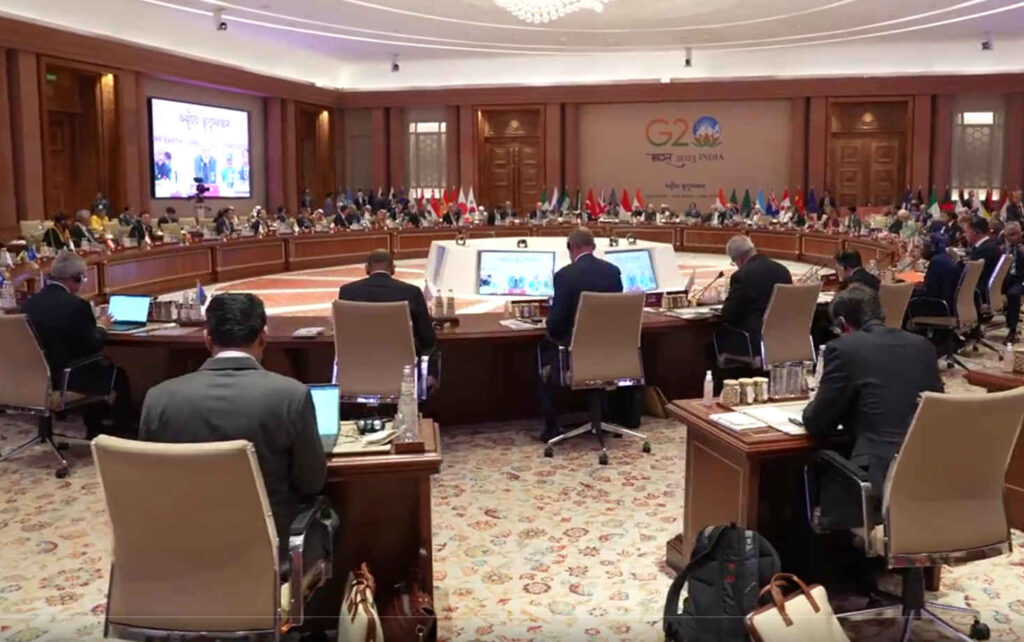
The document focuses heavily on climate and sustainability issues, and addresses the conflict in Ukraine.
The world’s 20 largest economies released a joint declaration after a summit in the Indian capital of New Delhi on Saturday. The document was hashed out amid major geopolitical tensions between a number of members, while the conflict in Ukraine threatened to derail its adoption.
Ukraine
The declaration was always unlikely to take an explicit side on the conflict in Ukraine, due both to disagreements among members, and host nation India’s neutral position on the matter. With the paragraphs on Ukraine the last to be finalized, the declaration states that all nations “must refrain from the threat or use of force to seek territorial acquisition against the territorial integrity and sovereignty or political independence of any state,” adding that “the use or threat of use of nuclear weapons is inadmissible.”
With Russia and Ukraine each striking territory claimed by the other, this wording offers a technical compromise that Russia’s representative, Foreign Minister Sergey Lavrov, and his Western counterparts could both accept.
Noting that “the G20 is not the platform to resolve geopolitical and security issues,” the declaration nevertheless calls for a revival of the Black Sea Grain Initiative, which Russia withdrew from in July over the failure of the US and EU to keep their promise to facilitate exports of Russian food products and fertilizers.
The declaration explicitly calls for the “unimpeded deliveries of grain, foodstuffs, and fertilizers/inputs” from both Russia and Ukraine.
Sustainable growth
Indian Prime Minister Narendra Modi entered the summit aiming to “strengthen the voice of the Global South,” he told delegates on Saturday morning. Accordingly, the declaration calls for a reshaping of global financial institutions to “promote growth, reduce inequalities and maintain macroeconomic and financial stability.”
Developing countries should have their debts restructured in some cases, and these nations should be given access to a “non-discriminatory, fair, open, inclusive, equitable, sustainable and transparent multilateral trading system” the document states.
The document also calls for increased research into “climate-resilient and nutritious grains,” and an increase in global fertilizer production to combat food shortages.
Climate agenda
The declaration calls for “the full and effective implementation of the Paris Agreement and its temperature goal.” Reaching this goal of limiting global warming to two degrees above pre-industrial levels will require “meaningful and effective actions,” including higher carbon taxes, an end to fossil fuel subsidies, and the phasing out of coal power, the document states.
Reaching these targets will be a costly enterprise, however. The declaration notes that developing countries will need up to $5.9 trillion by 2030, while the entire world will need $4 trillion per year by 2030 to reduce carbon emissions to net zero by 2050.
The multipolar world
While the leaders of India, China, and Russia have all heralded the emergence of a “multipolar” world order, in which the collective West is no longer the sole arbiter of international relations, the declaration avoids mention of the term.
Instead, it calls for reform at the United Nations, stating that the UN must be “responsive to the entire membership, faithful to its founding purposes and principles of its Charter and adapted to carrying out its mandate.” India in particular has repeatedly called for a permanent seat on the UN Security Council, and for more developing countries to be given seats on the body.
The language of the final declaration, however, is more vague. It calls for “a more inclusive and reinvigorated multilateralism,” to “make global governance more representative.”
Talk of multipolarity will likely dominate future meetings of the G20, with BRICS members Brazil and South Africa due to host the 2024 and 2025 summits, respectively.